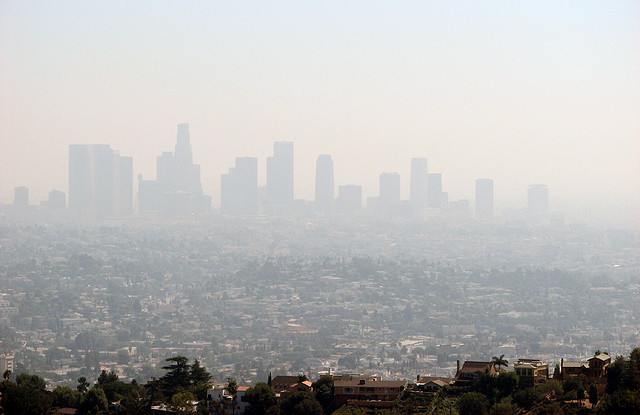Important Clean Air Act (CAA) elements direct the US Environmental Protection Agency (EPA) to reduce emissions of hazardous air pollutants (HAPs). Unlike the conventional pollutants associated with regional problems such as smog or acid rain, HAPs represent a list of 187 specific air toxics that can be harmful in low concentrations in much smaller areas. HAPs are subject to tighter controls and lower permitting thresholds.
Audit, Compliance and Risk Blog
Tags: Business & Legal, Health & Safety, Environmental risks, Environmental, EHS, EPA, Greenhouse Gas, ghg, Hazcom, mact
EPA May Require Spill Prevention, Control and Countermeasure Plan
Posted by Jon Elliott on Mon, Sep 08, 2014
The Clean Water Act (CWA), as amended after the Exxon Valdez spill by the Oil Pollution Act of 1990, imposes oil spill planning requirements on onshore and offshore facilities involved in the handling and transport of oil. These facilities may be required to prepare and implement a Spill Prevention, Control and Countermeasure (SPCC) Plan (and perhaps a more detailed Facility Response Plan). During 2001-2011, EPA adopted a series of significant changes to its SPCC Plan regulations, requiring compliance by most facilities no later than November 10, 2011.
Tags: Business & Legal, Health & Safety, OSHA, Environmental risks, EHS, EPA, Underground Storage Tanks
Managing Confined Space—Ensuring Worker Safety in Unusual Circumstances
Posted by Melanie Powers on Wed, Sep 03, 2014
Free Webinar
Date: Tuesday, September 9, 2014
Time: 2:00 PM - 3:00 PM EDT
Free! All are welcome
Tags: Employer Best Practices, Health & Safety, OSHA, Employee Rights, Training, Environmental risks, EHS, Webinar
The 15th Annual Creek Week will take place September 20th – 28th, 2014. Creek Week is an annual community event celebrating Santa Barbara’s local creeks and the ocean with many groups sponsoring events to help build awareness and stewardship of the natural treasures of the area.
Tags: Corporate Governance, Business & Legal, Health & Safety, Environmental risks, Environmental, EHS
New Executive Order Pursues Labor Law Compliance By Federal Contractors
Posted by Jon Elliott on Tue, Aug 19, 2014
On July 31, President Obama issued Executive Order (EO) Number 13673, establishing a series of reporting and procedural requirements for federal contractors, inducing them to provide “Fair Pay and Safe Workplaces” to their employees. Beginning in 2016, these new requirements will apply to contracts and subcontracts to provide more than $500,000 in services and/or non-standard goods to federal agencies. Some requirements are specific in the EO, while others will become clearer after revisions to the contracting standards codified as the Federal Acquisition Regulation (FAR).
Tags: Corporate Governance, Business & Legal, Employer Best Practices, Health & Safety, Employee Rights, Training, Environmental risks, EHS, EEOC, Disability benefits
Now that you’ve switched from ordering paper or CD publications to online ones from STP, I thought I’d share a few creative ways to make your old binders and CDs useful!
Tags: Business & Legal, California Legislation, Environmental, EHS
Mount Polley Dam Breach: KSM Mine Opponents Renew Fight
Posted by Mark Sabourin on Mon, Aug 11, 2014
Tags: Corporate Governance, Business & Legal, Employer Best Practices, Health & Safety, Environmental risks, Environmental, EHS, Hazcom, effluent, Canadian
Vehicle Maintenance: Begin Recycling Your Used Motor Oil Today
Posted by STP Editorial Team on Thu, Aug 07, 2014
Did you know that if all the oil from American do-it-yourself oil changers were recycled, it would be enough motor oil for more than 50 million cars a year? Wow! Imagine how much foreign oil that would eliminate.
Tags: Corporate Governance, Business & Legal, Training, Environmental risks, Environmental, EHS, EPA, Transportation
Supreme Court Narrows EPA Authority to Regulate CO2 Emissions
Posted by Jon Elliott on Mon, Jul 21, 2014
Since the US Supreme Court affirmed in 2007 that the Clean Air Act (CAA) provides the Environmental Protection Agency (EPA) with authority to regulate carbon dioxide (CO2) and other greenhouse gases (GHGs), EPA has pursued a growing set of regulatory initiatives. In each, EPA has attempted to fit GHGs into statutory and regulatory programs originally designed for more conventional pollutants – and the entities it targets have sued the agency claiming the stretch to GHGs exceeds EPA’s authority. Each court decision has adjusted the contours of EPA’s CAA authority, legitimizing some stretches and vacating others.
Tags: Corporate Governance, Business & Legal, Environmental risks, Environmental, EHS, EPA, Greenhouse Gas, ghg
NTSB and PHMSA Focus on Facility Response Plans for Pipelines
Posted by Allison Campbell on Mon, Jul 14, 2014
Investigation of the 2010 spill at Marshall, Michigan, the largest on-land spill in US history, underlines the reality that a Facility Response Plan (FRP) is more than a government-required document—an inadequate document or plan can lead to environmental and economic disaster. Owners and operators of onshore pipelines must review and update FRPs every five years from the date of last submission or last approval, and whenever new or different operating conditions arise that would affect the plan. (49 CFR 194.121 Response Plan Review and Update Procedures). PHMSA recently released two Advisory Bulletins reminding operators what it requires in an FRP and listing five of the most common reasons for it to reject an FRP.
Tags: Corporate Governance, Business & Legal, Health & Safety, Environmental risks, Environmental, EHS, EPA, Greenhouse Gas, ghg, Hazcom, Oil & Gas, Transportation










